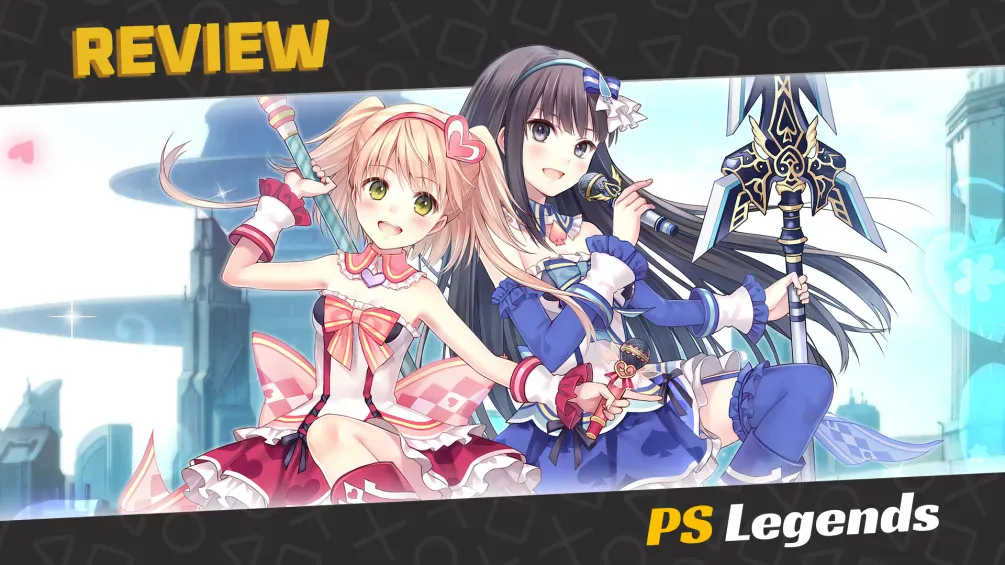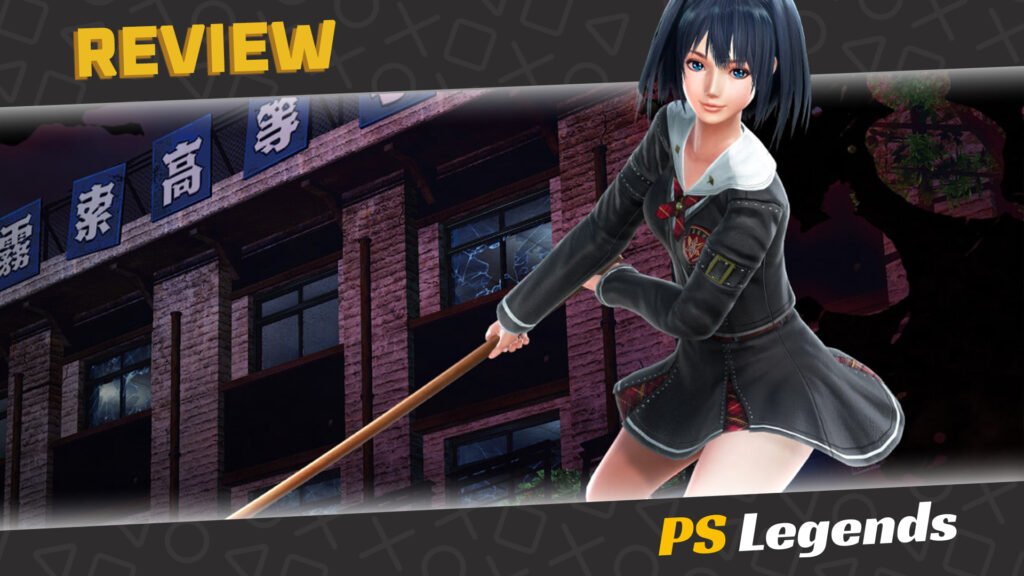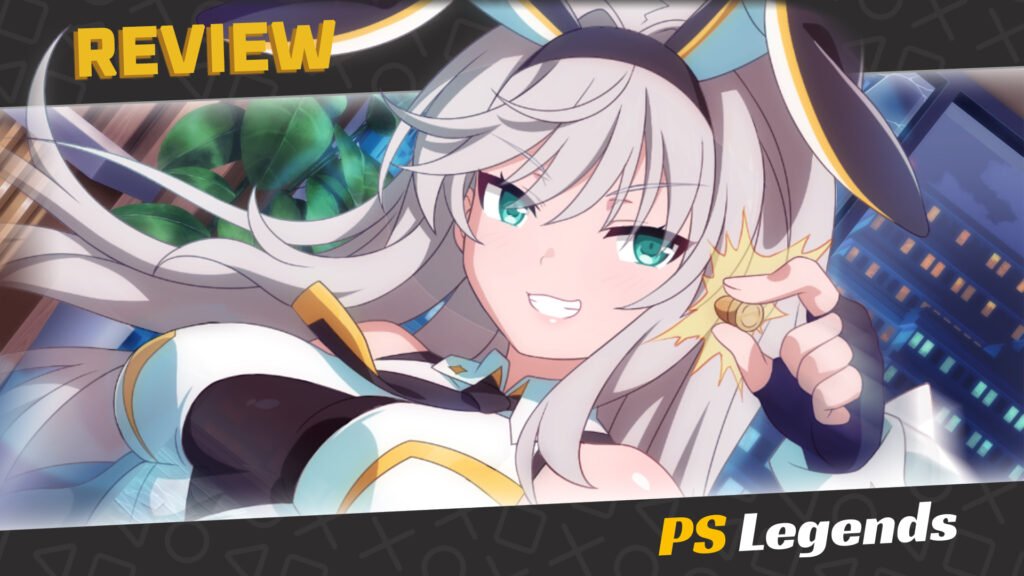As a big turn-based JRPG fan, many examples of this ageing genre have found a permanent place in my heart. Others, however, leave a bitter taste in my mouth after presenting the building blocks of something great, only to fail to live up to that potential with needlessly over-complicated mechanics, lacklustre storytelling and broken progression.
Omega Quintet was actually the very game that persuaded me to pick up a PS4 shortly after launch, following a series of hits from Compile Heart back on PS3. With the developer taking a break from its Neptunia franchise at the time, Omega Quintet had the potential to be the start of a promising new IP, bringing together the best bits of the previous generation in a whole new setting.
On This Page
Introduction
Omega Quintet is a JRPG developed by Galapagos RPG, a subsidiary of Compile Heart, for the PlayStation 4. It is a hybrid of a classic, turn-based RPG and an idol simulation game. The player controls Takuto, the manager of the ‘Verse Maidens’, an idol group that use the power of song and dance to fight off a mysterious monster outbreak known as the ‘Blare’.
Omega Quintet is the first game by Compile Heart for the PlayStation 4, and also the first retail game for the PS4 to utilise the PlayStation Move for optional mechanics. The game was released on April 28th, 2015, in North America, and on May 1st, 2015, in Europe and Australia.

Story
Omega Quintet takes place in a post-apocalyptic world that is being ravaged by a phenomenon known as the ‘Blare’, which has been degenerating most life on the planet by affecting bodies and minds. The game’s prominent characters are the ‘Verse Maidens’, an idol group with the power to fight off those afflicted with the monstrous transformations resulting from the Blare. These powers are used to save humankind, by giving them hope and dreams. The members of the Verse Maidens are Otoha, Kyoka, Kanadeko, Nene, and Aria.
Otoha is the newest member of the Verse Maidens, and a secondary protagonist of sorts. She lacks confidence and experience, but is usually positive, though prone to making clumsy mistakes. Kyoka has a strong sense of responsibility who does her job as a Verse Maiden while caring for others, and also has a hard time expressing her feelings. Nene is very timid and often nervous and weak-willed, who often shies away and hides behind Kanadeko, who herself is ditsy, reckless and tomboyish. Lastly, Aria, the eldest active member of the Verse Maidens, is mysterious, distant, and struggles with PTSD.
Other characters include Takuto, or ‘Takt’ for short, the protagonist of Omega Quintet and a somewhat cynical guy who is pressured into agreeing to work as the Verse Maidens’ manager and bodyguard, though having the constant attention of five beautiful girls certainly has its benefits. Momoka, a veteran, retiring Verse Maiden, Ayumi, Momoka’s manager, Shiori, Kyoka’s coach, Godou, the leader of the neighbourhood watch, and Tomekichi, a fan of the Verse Maidens and the leader of one of their fan groups, are also around to support.
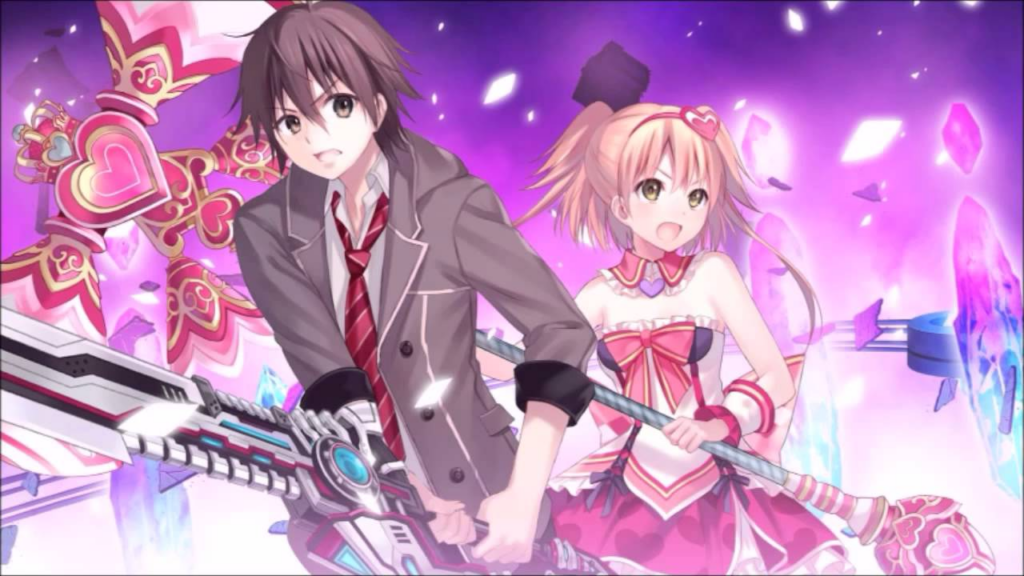
Gameplay
The plethora of combat mechanics introduced in Omega Quintet can offer a pleasing variety of options in battle. Button mashing basic attacks is certainly an easy option and a good way to deliver some surprisingly stylish combos, while taking the time to learn newer ideas which utilise the ‘Voltage Gauge’ can turn the tide in tense situations and deliver significant damage.
Omega Quintet lets players make light waves and effects using the PlayStation Move controller, and they can feature in a music video by using the PlayStation 4 camera. During the game’s fights, its Voltage Gauge fills up when Takuto protects the idols when the player attacks the enemies. When it rises to a certain point, the player can activate Live Mode, which gives the idols bonuses. The player must also adjust the turn order successfully, as team attacks are formed if characters act one after another.
The game features costume damage in a manner similar to Senran Kagura, which happens when the girls get parts of their clothing torn off as a result of taking repeated damage from enemies. Another feature in the game is the PVS (Promotion Video System), which allows players to make their own dance videos and customise live performances to their liking. This is done by choosing from over 150 dances for the characters.
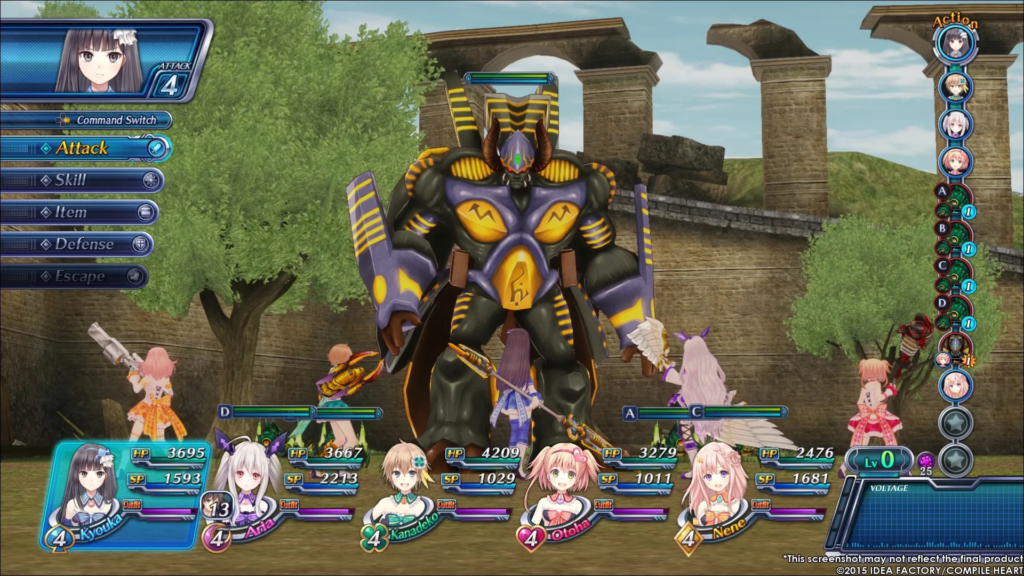
Graphics/Sound
While I don’t think anyone was expecting miracles from a mid-budget anime game, Omega Quintet seems rather stuck in the past with its presentation quality, resembling an early PS3 game. There’s a diverse colour palette on show, particularly in its character designs, however everything looks a little washed-out and downscaled from standard HD quality.
Character combat animations have a smooth quality to them which makes for some nice stylish combos that flow elegantly, while outside of battle, character movements can be wooden and rather janky at times. The 2D sprites used in conversation-heavy ‘visual-novel style’ cutscenes are detailed enough, though yet again, are also rather lifeless. When indoors, the camera also has the annoying habit of locking up just before it hits a wall, rather than working its way around it.
The music makes for an odd mix of ideas, with vibrantly bouncy Japanese girl-groups performing the tracks for the bigger J-pop show pieces, while everything else feels rather flat and unambitious, with filler tracks reminiscent of PS2-era midi-tunes filling the spaces in between. At least the English voice cast do a stellar job, with VA all-stars including Brianna Knickerbocker, Christine Marie Cabanos, Erica Lindbeck, Stephanie Sheh, Erica Mendez, Xanthe Huynh and Johnny Yong Bosch joining the cast.

Conclusion
Omega’s biggest issue is that too many mechanics are introduced here, and while most are optional, failing to explore the PVS system and ignoring time-sensitive side-quests is a sure-fire way to lock yourself out of the game’s true ending. To make matters worse, learning new skills by either choosing them at random or even based on what looks most appealing at the time can result in you playing yourself into a corner.
Yes, Omega’s silly and somewhat overstretched story is far from the game’s biggest issue as we have to contend with serious progression problems that rival those game-ending scenarios that we saw when trying to enter dungeons that our Scouts hadn’t discovered yet from optional mini-games in a handful of Neptunia games, or finding story triggers which require you to be in an unspecified place at an unspecified time in countless Atelier games.
Your destination will often lie at the far end of a sprawling dungeon, only to find some form of barrier blocks your way and can only be removed by having a particular character unlock a particular skill. What escalates the situation from ‘irritating’ to ‘broken’ is that the game doesn’t tell you where your exact objective lies, which skills are required to bypass barriers, or even when and which character should learn said skill.
It’s this broken progression system which makes Omega Quintet an annoyance to play, and soon enough, entirely unplayable. It’s a shame because the cute characters and flashy combat tease the player by getting the basics right, only to suddenly lose momentum once the story gets going. You could fumble around for hours hoping you might trigger the right skill and stumble into the right area, but it’s far easier just to turn the game off.

Joys
- Pretty girls with varied, quirky personalities
- Decent combat with plenty of style and substance
Cons
- Unclear objectives forcing you to wander around aimlessly
- Broken progression system which relies on skill acquisition without explanation
- Basic visuals and sound
